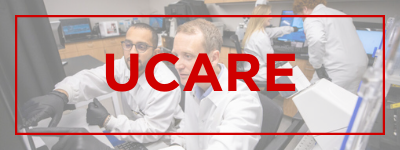UCARE: Undergraduate Creative Activities and Research Experiences

UCARE: Research Products
Date of this Version
4-2016
Document Type
Poster
Citation
UCARE Research Products, University of Nebraska-Lincoln, Research Fair, Spring 2016.
Abstract
SUMO proteins are small ubiquitin-like modifiers. They can be attached to a target protein through a process called SUMOylation that involves an enzymatic cascade catalyzed by SUMO E1 (activating enzyme), E2 (conjugating enzyme) and E3 (ligation enzyme). Similar to ubiquitination, SUMOylation has been found in recent years to play a role in the regulation of pathogen-host ”arms race” (Chen, A. J., et al., 2013). However, the molecular mechanism behind the regulation is largely unexplored. To date, only ONE SUMO E2, UBC9 has been identified and confirmed to catalyze SUMOylation in human cell (Motion, G. B, et al., 2015). Nevertheless, recently FIVE genes were identified by using an array of bioinformatics analysis tools that encoding putative SUMO E2 proteins in tomato. Additionally, a recent study indicated that three of the five putative SUMO E2 genes are induced when plants were infected by pathogen that can trigger plant ETI (effector-triggered immunity) defense response, suggesting that they might be involved in plant immunity (Pombo, M.A., et al., 2014). This research will assist in identifying novel SUMO E2 enzymes and establish the connection of SUMO E2 protein (SlUBC43) to plant immunity, which will lead to a better understanding of how the plants defend themselves against the pathogen


Comments
Copyright (c) 2016 Huan Zhang